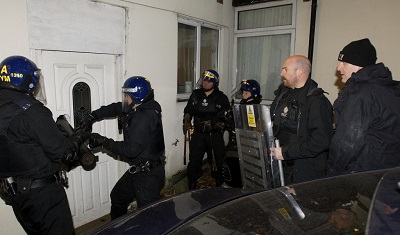
A “No-knock warrant” is any search warrant issued by a judge that does not require law enforcement officers to knock and announce their presence before entering a particular premises. Police obtain no-knock warrants to maintain the element of surprise, so suspects have no opportunity to destroy evidence or arm themselves. Although they serve a purpose under certain circumstances, no-knock warrants come with problems and risks.
What Are the Problems Associated with No-Knock Warrants?
When police burst into a residence without warning, by any means necessary, including breaking down the door, it can be very disturbing for the people inside, particularly children. These types of police raids create a heightened sense of fear that can lead to violence. Both suspects and law enforcement officers, or even innocent bystanders, can get hurt. Examples include:
- Breonna Taylor, an unarmed black medical worker who died after being shot by police exercising a no-knock warrant. This police shooting occurred in Louisville, Kentucky in March 2020, as stated by the New York Times.
- Amir Locke was fatally shot by Minneapolis police acting on a no-knock warrant in early February 2022. Mr. Locke’s name was not on the warrant, but he was shot and killed seconds after police entered the home, as reported by WCNC.
What Restrictions Are Set on Police Regarding No-Knock Warrants?
The Fourth Amendment to the U.S. Constitution protects citizens from unreasonable search and seizure and requires probable cause for search warrants to be issued. Under South Carolina law, courts are not allowed to issue no-knock warrants except when probable cause exists that:
- A person suspected of committing murder or kidnapping is on the premises; or
- Giving notice to a criminal suspect of the execution of a search warrant may create imminent danger to the life of the police officer executing the warrant or another person.
In July 2020, the Supreme Court of South Carolina placed a moratorium on the issuance of no-knock warrants by all circuit and summary court judges statewide in a judicial Order. The moratorium is to remain in effect until South Carolina judges receive instruction, to be provided by the Judicial Branch, on the criteria to be used to determine whether a no-knock warrant should be issued. The provisions of the Order went into effect immediately upon issuance and will remain in effect until amended or revoked by a subsequent order of the Chief Justice.
How Do You Know When Your Rights Have Been Violated?
If you have been subjected to police invasion of a premises under a no-knock warrant and you believe your rights were violated, your best course of action is to speak with an experienced personal injury attorney as soon as possible. You may have a claim for compensation against the responsible parties. Even if you did not sustain physical injuries, you may be entitled to recover damages for other losses, such as property damage, mental anguish, and emotional trauma. We can tell you if you have a case and what damages you may be entitled to claim.
Why Choose Allen Law?
Our founding attorney, Julian Allen, is a former insurance defense lawyer with extensive experience on both sides of the courtroom. He has been rated AV Preeminent® by Martindale-Hubbell®, awarded membership in the Multi-Million Dollar Advocates Forum, and named among South Carolina Super Lawyers®. We are dedicated legal advocates for people who have been victims of police misconduct, including unnecessary or excessive use of force and wrongful search and seizure.
Call Allen Law at (843) 882-5005 to schedule a free consultation with no time limit. We work on a contingency fee basis, meaning you pay us no fees until we recover compensation for you.

